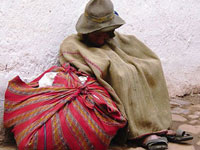US cities bans charities that give food
Dallas authorities sent at least 35 warnings to homeless advocate Will Edwards to stop feeding people living on the streets.

Dallas authorities prohibit charities from distributing free food to homeless people except at city-approved locations and only after volunteers undergo food safety training, provided for free by the city. Violation of the law, enforced by city food inspectors, is punishable by a fine up to $2,000 (€1,366).
Edwards, 53, who runs Rip Parker's Memorial Ministry, contends an ordinance regulating homeless feeding to approved locations is illegal. He and another ministry have a pending federal lawsuit targeting the regulation, which went into effect last year.
"The laws are not going to make us stop," Edwards said Thursday. "What the law has done is gotten rid of a lot of volunteers, a lot of help and lot of the resources that people have supplied."
Dallas is among U.S. cities criticized in a new report for its approach to homelessness. The cities continue to criminalize homelessness, but they have a new tactic - targeting residents and church groups who share food with them, according to the report released Thursday by two homeless advocacy groups.
Cities use a wide variety of tactics to discourage residents from giving food to the homeless and other poor people, according to "Feeding Intolerance: Prohibitions on Sharing Food with People Experiencing Homelessness."
The 20-page report is a joint effort of the National Law Center on Homelessness & Poverty and the National Coalition for the Homeless. It looks briefly at 23 cities where "unfair restrictions" on sharing food have been enacted. Only in a few cases have fines been issued or arrests made, according to the report.
Dallas officials say the city's ordinance was designed to combat litter, eliminate food-borne illnesses and attract the homeless to places where they could receive a variety of services, not just meals.
"Restricting the feeding of homeless people in public spaces nationwide is just another veiled effort to push the visible poor out of downtown America," said Michael Stoops, acting executive director of the National Coalition for the Homeless.
At the same time the cities are pursuing measures targeting groups that share food with the homeless, most cities do not have adequate shelter or food resources to meet the need, according to the report, which cited the U.S. Conference of Mayors' 2006 Hunger and Homelessness Survey.
The report urged local authorities to collaborate with homeless advocates to improve access to food stamps and other resources for the homeless.
Subscribe to Pravda.Ru Telegram channel, Facebook, RSS!


